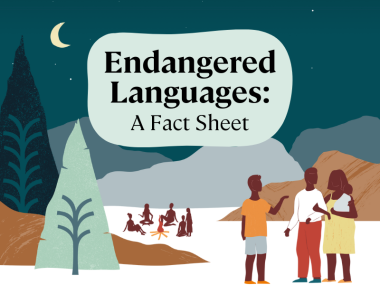Language Reclamation Backlash
Dr. Gerald Roche, La Trobe University
Language reclamation always happens in a bigger social and political context that extends beyond the people and community who are working to reclaim their language. It almost always happens with some sort of support from that broader context. But that broader context can also be a source of resistance. That’s what I’m going to talk about here: what I call language reclamation backlash.
I don’t do language reclamation work myself, but it’s something I try to support, and advocate for, and to help other people understand better. Most of my work has been with people and communities in Tibet, and this has involved advocating for language rights with non-government organizations around the world, and raising awareness of the problem via social media. It’s in doing these sorts of work that I first encountered the sort of backlash I’m going to talk about here.
But before I talk about that, it might be useful to start with a definition of what reclamation backlash is. Basically, reclamation backlash is any effort to oppose language reclamation. That might involve efforts to totally shut down language reclamation efforts. Or it might just involve things that sap the time and energy of people and organizations that are doing language reclamation work. A few examples will give you a better idea of what I’m talking about. Once we’ve looked at those, I’ll talk about different types of backlash, and what you can do when you encounter it.
Examples of Reclamation Backlash
Let me start with my own experience. I lived and worked with Tibetan communities in China for eight years. In China, the government refuses to recognize the existence of many languages that Tibetans speak, and the outcomes have been disastrous. No recognition means no support: no mother tongue education, no media, nothing. When that is coupled with aggressive promotion of the national language, you get widespread language loss. Communities are working hard just to continue speaking their languages, but efforts to agitate for real change that would support this are typically met with harsh responses.
So my work, especially since I left China, has involved advocating for those languages and the communities and people that use them. I speak with international NGOs and ask them to help raise awareness of the struggles these communities face. And I also write articles and take to social media to try and raise awareness about these problems. But so far my advocacy hasn’t created much change. There’s two main reasons for this.
One is that the languages I’m advocating for aren’t well-known and they’re not well-described in the literature. And second, there’s a widespread assumption that all Tibetans speak the same language, which isn’t true. So when I try to talk to people about these languages, I’m met with one common form of backlash: denial. People simply say that these languages don’t exist. They refuse to believe things we already know, and which they have to accept as the foundation for any sort of meaningful change.
Denial appears in lots of different forms, and seems to be a common form of reclamation backlash. I’ve written about this in the Australian context with Ngarigu woman, linguist, and language reclamation practitioner Professor Jakelin Troy. We examined social media comments in Australia that people made in response to articles about Indigenous language reclamation. The ignorance and aggression were astonishing. Many people refuse to believe that language reclamation is possible, or that it benefits people. Some people argue that language reclamation is actually harmful. All these ideas are forms of denial, because we know that language reclamation works and is beneficial. And when people express these ideas on social media, they’re engaged in backlash: they’re trying to oppose language reclamation work.
Another place where similar sorts of backlash has been described is Ireland and Scotland. Dr Emily McEwan has written about what she calls ‘anti-Gaelic bingo’. The opposition to language reclamation is so predictable you can just tick the comments off a prepared list: it’s a waste of money, the language is already dead, it’s just a tiny number of people so it doesn’t matter, the language is useless, people who speak it are backwards. It goes on and on. Professor Wilson McLeod makes a good point about these sort of comments. They’re not just ignorant: they’re harmful. They’re an attack on the people and communities who are trying to reclaim their languages.
Types of Backlash
We can identify three different types of backlash that you might encounter in doing language reclamation work.
The first type is overt hostility. This includes open expressions of hatred, anger, and disgust. It is often racist and anti-Indigenous. If the source is a man and the target is a woman they’ll often throw in some misogyny for good measure. The people who engage in this sort of backlash are bigots. Sometimes they’re proud bigots, but not always. A lot of writing and thinking about anti-racism can help you understand and deal with this sort of backlash.
A second type of backlash is harder to spot and harder to deal with. I’ll call it liberal backlash. This sort of backlash usually expresses concern rather than hostility. People are concerned that language reclamation will make people less free (or it will undermine national unity). Or they’re concerned that it’s a waste of money. Or they worry that language reclamation will isolate Indigenous people. Whatever their concerns are, these people think language reclamation is good in principle, but in practice they will do whatever they can to take time and energy away from people actually trying to do language reclamation work.
The final type of backlash is probably the hardest to deal with. It is backlash from within the community. It occurs across generations, between families, and between communities. I don’t have much to say about this sort of backlash, except that I think these conflicts are a product of the same violence that disruptedeliminated the language in the first place. Blame belongs with the aggressor, not the victims.
Dealing With Backlash
I want to end with some suggestions for dealing with backlash. These are based on my own experience so it’s important to remember how that’s limited to advocating for other people’s language rights, rather than trying to reclaim my own language.
My first suggestion is: take care of yourself. I’ve been the subject of Twitter pile-ons, Facebook frenzies, and slander in print media. I’ve been threatened with physical violence and received extremely long hate mails. It’s stressful. But facing this sort of backlash is inevitable when you’re doing any work that aims to challenge the status quo and change the world - and that’s what language reclamation does. If you’re expecting backlash it’s easier to cope with it. And it helps to have a network of people around who know what you’re going through and can support you.
My second suggestion is: choose your battles. Responding to backlash can sometimes work. Sometimes, you can change people’s minds. You can win more support, find new allies, and even encourage people to do language reclamation work themselves. But not always. Sometimes people just believe what they believe and don’t want to change. Sometimes people just aren’t ready to hear from you right now. So, find ways to figure out which battles are worth fighting, and when it’s best to save your time and energy for other, more important things.
And finally, one way of dealing with backlash is to learn more about it and other types of backlash and how they work. For me, I’ve found reading Sarah Ahmed’s work really helpful. Her blog, Feminist Killjoys, deals with the issue of backlash a lot, and she’s written about it in her books Living a Feminist Life and On Being Included. I’ve also learned a lot about identifying and dealing with denial from the work of social psychologists. Stanley Cohen wrote a book called States of Denial which offers a really rich discussion of all the forms that denialism takes. And Irene Bruna Seu has written a book called Passivity Generation, about how human rights advocates meet denial in their work, and how they can deal with it. I also think that reading about the politics of conspiracy theories is helpful, because in some ways, reclamation backlash is a conspiracy that tries to stop people from claiming their rights and reclaiming what was taken from them.
In conclusion, I think it’s important to expect backlash, to learn to identify it, and try to deal with it. But it’s also important to acknowledge that there are limits to what you can do. Backlash only really stops when the people doing it stop. The burden is on them, not you.



